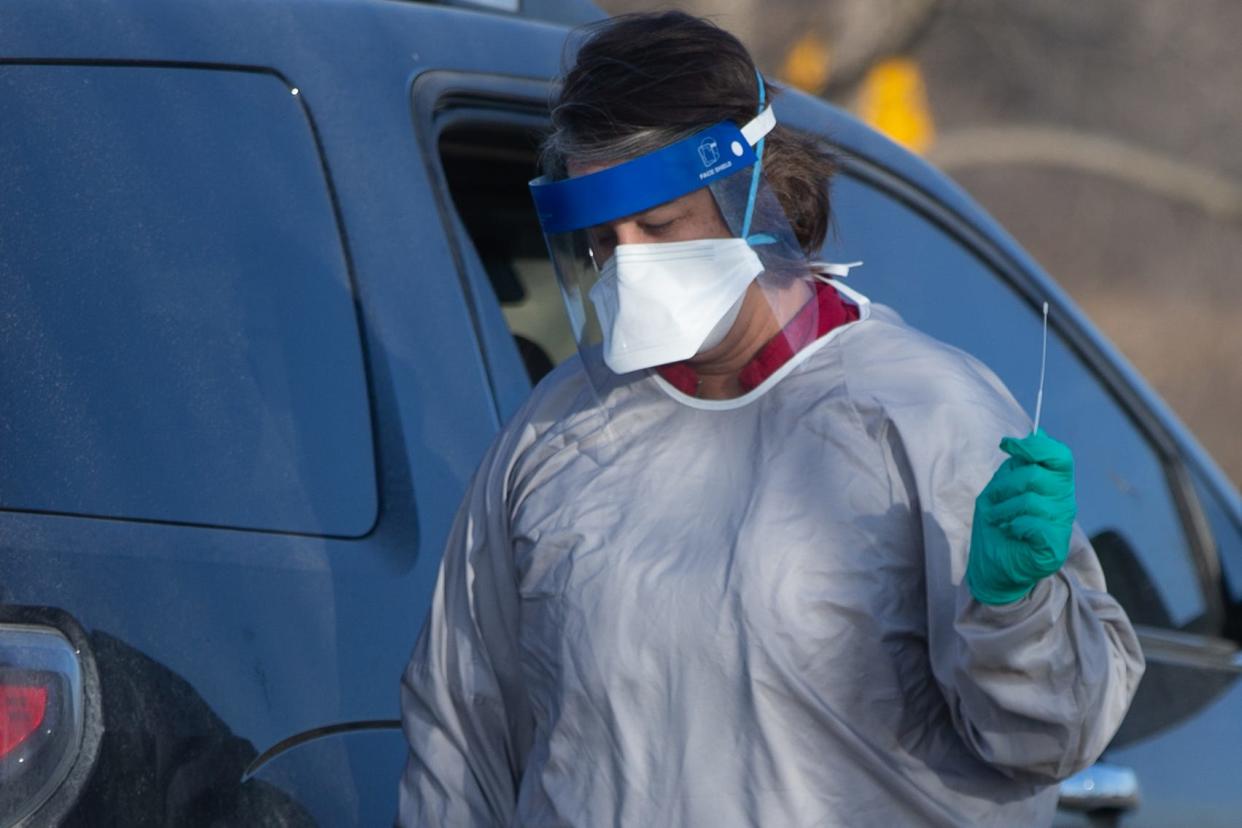Trying to figure out if your symptoms are the cold, flu or COVID? Kansas doctors say get tested.

- Oops!Something went wrong.Please try again later.
Are you feeling a little under the weather, trying to figure out if your symptoms are the common cold, seasonal flu or a coronavirus variant?
You should stop trying to guess your sickness and get tested for COVID-19, Kansas doctors say.
"I think that's very dangerous," Dana Hawkinson, an infectious disease specialist at The University of Kansas Health System, said of people trying to self-diagnose an illness based solely on flu-like symptoms. "Most clinicians would not do that.
"Certainly there are some things that maybe have a more predominance for certain illnesses. Again, these are all viruses, whether it's the common cold virus, rhinovirus, whether it's a common cough and cold coronavirus, whether it's influenza, whether it's SARS-CoV-2, they're all viruses. They all have similar ways of presenting.
"So I think if there's any question, the first thing you really need to do is go out and get a test — if you can get a test."
Many flu-like illnesses are circulating now. The delta and omicron variants are in Kansas as the state has high community spread of COVID-19. The state is also one of the worst in the country for seasonal influenza.
"There is absolutely no way based on symptoms that you can distinguish between a common cold, omicron and delta," said Steve Stites, chief medical officer at KU's Kansas City, Kan., hospital.
"Now we'd like to, and people can give you odds about it, and you can hear all the experts say, 'Well, you know, I can do this.' No, no you can't. Because we've seen people with COVID presenting with diarrhea. We've seen people with COVID presenting with loss of sense of taste or smell. We've seen people with COVID presenting with nasal congestion, sore throat, runny nose, cough, fever, — well wait, that's what we all get when we have a cold. So how is that any different?
"The reality is, you can't distinguish. And that's the weakness, and because that's the weakness, we have to figure out how to prevent it."
More: Omicron variant is in Shawnee County as public health officials warn of contagious COVID
Kansas among states with highest flu levels
Kansas is among the five states and territories with the highest flu activity levels in the country, according to data released last week by the Centers for Disease Control and Prevention.
The federal health agency reported increasing flu activity, with a high prevalence of the influenza A (H3N2) strain, especially among children and young adults. Flu hospitalizations are rising nationwide, and the first two pediatric flu deaths of the season were reported last week.
So far, flu vaccine uptake has been lower than last year.
"The flu season is just getting started," CDC officials said. "There’s still time to get vaccinated. An annual flu vaccine is the best way to protect against flu and its potentially serious complications. CDC recommends everyone 6 months and older get a flu vaccine."
The Kansas Department of Health and Environment reported an increase in flu hospitalizations and urged people to get vaccinated.
"We're going to have flu this year," said Rachael Liesman, director of KU's clinical and molecular microbiology laboratories. "And I think that that's gonna further stress our laboratory and our hospital.
"We saw a flu emerge in early December, circulating in the community. We're running about 2-6% positivity. Most of it's H3N2, which tends to be a bit more of a severe flu year than other years. So I think that all of the precautions that that we are asking folks to take to prevent SARS-CoV-2 infections are also going to help us bend the curve a little bit on influenza, which is going to be really important."
She urged people to wear masks, wash their hands, and to get vaccinated against both the flu and COVID-19.
Liesman said federal reports have suggested that over-the-counter rapid antigen tests have reduced sensitivity to omicron. She said she has heard anecdotal reports indicating rapid tests not catching some symptomatic COVID-19 cases in recent weeks that were later discovered through PCR tests.
More data is needed to understand how well the rapid tests perform with the new variant.
"But it is really disappointing, because we need all of the tools in the toolbox for this winter," Liesman said. "So having a decreased sensitivity of those antigen tests, I think is going to be a challenge."
More: Kansas hits 7,000 COVID deaths: 'We have the tools to prevent further unnecessary deaths'
Get COVID-19 test when sick if you have access
Still, though, people experiencing symptoms consistent with COVID-19 should "definitely take that test" if they have access to one, she said. But be aware that a negative antigen test may or may not be accurate and a PCR test would be needed to confirm the negative.
Stites said it is getting more difficult to get testing because labs are overwhelmed and supplies are short. Liesman said labs are understaffed and will struggle throughout the winter.
"We're going to see delays in turnaround time," Liesman said. "We've already seen that nationwide. We've experienced some delays in our laboratory, and we're trying to work through that.
"But it's going to be a challenging time to get a test, which is going to make it very difficult for this particular omicron wave."
Jason Tidd is a statehouse reporter for the Topeka Capital-Journal. He can be reached by email at jtidd@gannett.com. Follow him on Twitter @Jason_Tidd.
This article originally appeared on Topeka Capital-Journal: Are my symptoms cold, flu, COVID, omicron? Kansas doctors say to test

